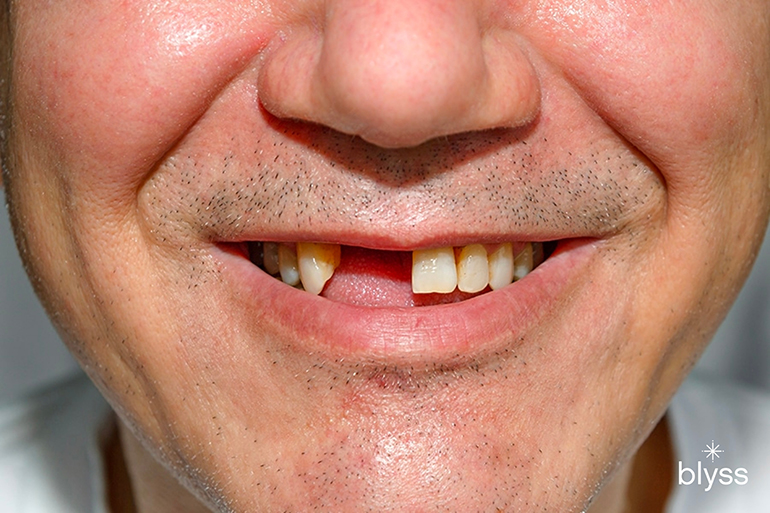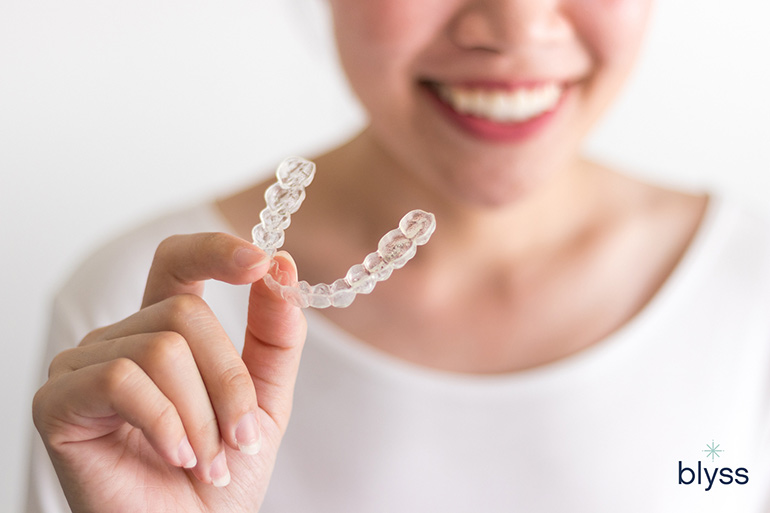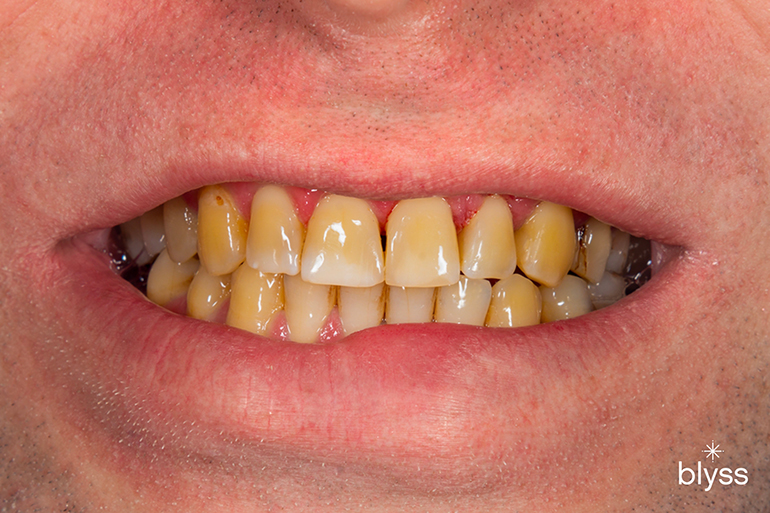When you have missing front teeth, it can be embarrassing to smile and difficult to talk or eat. You may feel like everyone is staring at you when you’re smiling or speaking. I can understand that it’s tough to feel confident in these situations.
That’s why I’m here to provide you with a dentist’s guide to the three best tooth replacement options.
What Factors Influence Tooth Loss?
There are a few different reasons why someone might lose one or more teeth.
The most common reason is due to an injury or trauma, such as being hit in the face with a ball or falling down and hitting your mouth on something. Other reasons include:
- tooth decay due to poor oral health
- gum disease
- congenital abnormalities (birth defects)
- eating disorders
- drug use
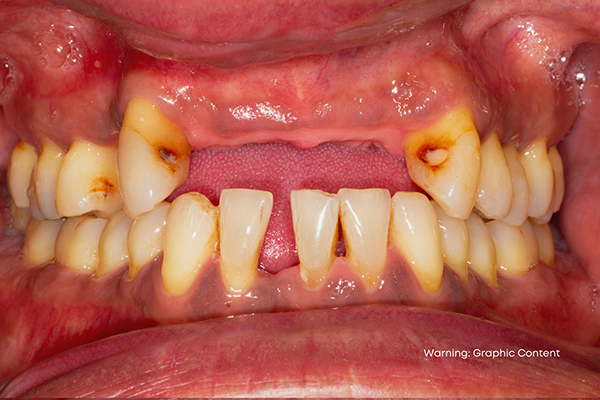
The buildup of bacteria and plaque on the teeth causes gum disease and cavities, which can lead to tooth loss if left untreated.
What Are the Effects of Missing Teeth?
Leaving gaps in your teeth untreated can lead to a number of problems, including:
- Shifting of the remaining teeth: When there are gaps in your teeth, the remaining teeth have a tendency to shift into the gaps with time. This can cause your bite to become misaligned and make it difficult to chew and speak properly.
- Speech difficulties: Missing front teeth can affect the clarity of your speech. This is because the front teeth play a vital role in the formation of certain sounds, such as “s” and “th.”
- Changes in facial features: When missing one or more teeth, the bones in your jaw can start to shrink and cause the shape of your face to change, resulting in a “sunken” look.
- Increased risk of gum disease: When there are gaps in your teeth, it’s easier for plaque and tartar to build up and cause gum disease.
- Bone loss: Teeth are embedded in the jawbone, and missing teeth can cause the bone to start to shrink, which can lead to the loss of neighboring teeth.
No matter the reason for your tooth loss, it’s important to see a dentist as soon as possible to discuss the best treatment options for you.
Your dentist will work with you to determine which option is best for you based on your individual needs and situation.
Now, let’s take a look at the three best options for replacing missing front teeth: implants, dental bridges, and dentures.
Option 1: Dental Implants
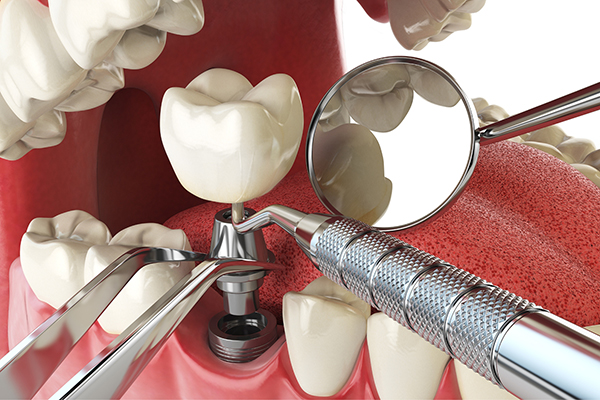
Since they are anchored directly into the jawbone, dental implants are much sturdier than traditional bridges or dentures.
A dental implant is a titanium post that is surgically implanted into the jawbone. Once the implant has bonded with the jawbone in a process referred to as osseointegration, an artificial tooth is attached to the post.
While there are many different brands and designs of implants available, they all have three major components:
- an implant (the titanium screw)
- the abutment (or connecting structure between the implant and crown)
- the crown (the artificial tooth)
Why Choose Dental Implants?
From an esthetic standpoint, dental implants look and feel like your natural teeth. But aside from looking and feeling great, there are several other advantages to using dental implants as a solution for missing front teeth:
- Most stable and durable solution for missing teeth, making speaking, chewing, and eating easier
- Prevent further bone loss in jawbone
- Last longer than traditional dentures or bridges (up to 20 years or more with proper care)
- Can replace multiple teeth without requiring irreversible damage of the surrounding teeth
- Require less maintenance than other solutions since they don’t need to be frequently replaced or adjusted
The American Dental Association recommends considering dental implants as a treatment option if you’re missing any of your front teeth due to trauma, decay, or gum disease.
According to a study published in the Journal of Prosthetic Dentistry, more than 98% of all implant placements were successful after 5 years.
This indicates just how reliable dental implants can be as long-term solutions for people who are missing one or more front teeth.
Interested in learning more about dental implants? Watch my video below to learn more.
Option 2: Dental Bridges
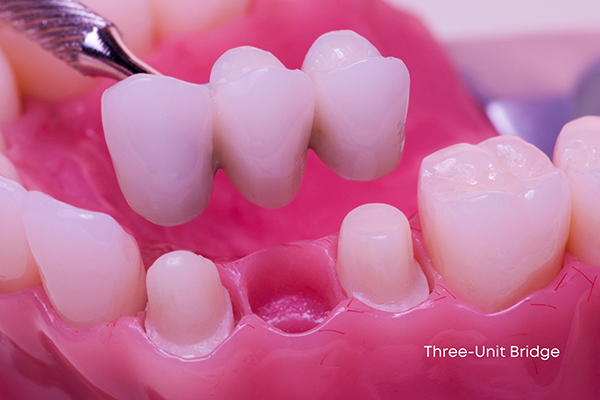
While bridges are a common and popular choice for replacing missing teeth, they aren’t for everyone. Schedule a consultation with your dentist to find out if you are a good candidate for a dental bridge.
Dental bridges are great for permanently filling in the gaps caused by missing front and back teeth.
They are made up of two or more crowns (retainers) that are attached to adjacent natural teeth or implants. These crowns hold the pontic, or artificial tooth, in place.
This “bridge” fills the space left by the missing tooth or teeth, restoring your smile and making it easier to chew and speak.
Types of Dental Bridges
- Traditional dental bridge: This is the most common type and is made up of a pontic (artificial tooth) held in place by two crowns (retainers) that are attached to adjacent teeth on either side of the missing tooth/teeth.
- Cantilever bridge: As the name implies, this type of bridge only has one abutment on one side of the missing space and is usually used when there is only one natural tooth available to support it. It is not a great option to replace missing back teeth, which are responsible for the heavy duty chewing of food.
- Maryland bonded bridge: Also referred to as resin-bonded bridges, these are created with a metal framework and porcelain or plastic false teeth which are bonded to existing teeth with metal or porcelain wings on either side.
- Implant-supported bridge: This type of bridge is secured to dental implants that have been implanted into the jawbone.
Why Choose Dental Bridges?
Dental bridges are a great option for missing front teeth because they:
- Are more secure and comfortable than removable partial dentures
- Restore the ability to chew, speak, and smile normally since they are fixed in place
- Last up to 15 years with proper care and good oral hygiene
- Are less costly than dental implants and may be at least partially covered by insurance
- Do not require surgery, but irreversible shaping of the adjacent natural teeth is necessary
- Fewer visits required (typically around two) than dental implants and dentures
Additionally, studies have shown that patients feel more comfortable speaking with a bridge than they would with dentures.
It’s clear that dental bridges are an effective solution for those looking to replace missing their front teeth.
Option 3: Dentures
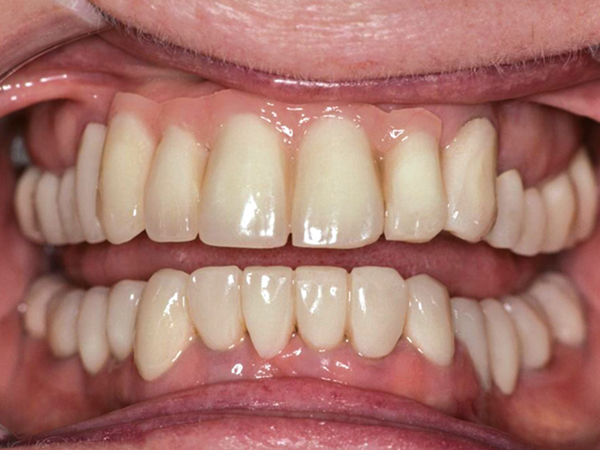
The base of the denture is made of either pink acrylic or gum-colored resin, and the teeth are usually made of porcelain or acrylic.
Dentures are artificial teeth that are used to replace natural teeth that have been lost or extracted.
They are false teeth that are custom-made to fit your mouth and blend in with your soft tissues and/ or natural teeth.
Dentures can be full or partial.
Full dentures are used to replace all of the teeth in either the upper or lower jaw. Partial dentures are used to replace just a few missing teeth such as the front teeth
Dentures can be removable.
Why Choose Dentures?
Dentures are a great option for missing front teeth because they:
- Are easier to adjust than fixed bridges
- Are typically less expensive than implant-supported solutions and bridges
- Can last up to to five years with proper care
- Do not require surgery, although regular cleaning and maintenance necessary
Dentures have come a long way in recent years and can now be virtually indistinguishable from your natural teeth.
And thanks to advances in dental technology, they’re more comfortable than ever before. Plus, with proper care, they can last for years.
Considerations For Choosing the Right Dental Solution
If you’re missing one or more of your front teeth, it can be intimidating to think of all the different ways to replace them. It can also be really difficult to decide which dental solution is right for you.
Before you make a decision, let’s explore the factors you need to consider.
1. Cost of the Treatment
How much are you willing to spend to replace your missing front teeth? Dental implants tend to be the most expensive option, followed by dental bridges, and then dentures.
It’s important to remember that cheaper isn’t necessarily better. You also want to consider the long-term costs of maintaining a particular type of restoration or appliance.
If cost is a major concern for you, talk to your dentist about financing options or see if your dental insurance will cover any of the costs.
2. Insurance Coverage
Do you have dental insurance? Does it cover your choice of treatment? If so, this will likely factor into your decision-making process.
Partial dentures are usually covered by insurance. However, dental implants and crowns are subject to insurance clauses.
Be sure to check with your insurance provider to see what coverage you have before making your decision.
3. Timeframe for Treatment Completion
How quickly do you want or need the missing front teeth replaced? How long are you willing to wait for treatment completion?
Dental implants require surgeries. The treatment can last over the course of 3-6 months. Meanwhile, bridges can be made in just one to two weeks at Blyss Dental. Dentures can take 1-3 weeks to make, depending on the type you select.
Dentures or bridges may be the best option if you wish to replace your missing front teeth relatively quickly.
4. Preservation of Jawbone Structure
When the teeth are lost, the jawbone begins to deteriorate over time. This can cause problems with eating and speaking and also lead to a sunken-in appearance in the face.
A dental implant is the only option that helps preserve the jawbone, which can help prevent the loss of neighboring teeth in the future.
Preserving your jawbone is key to preserving your facial features, especially for missing front teeth.
Unfortunately, dentures and bridges do not have this advantage.
5. Oral Function
Will the option I select feel like my natural teeth when I eat, speak, and smile?
Dental implants are the closest option to having your natural teeth restored. They look, feel, and function like your natural teeth. Bridges are fixed in place like implants, and so they are also more stable than dentures.
Dentures may take some getting used to at first and may not allow you to bite and chew as effectively as your natural teeth do. And sadly, with partial dentures, it may not be that easy to bite into a piece of your favorite steak.
Dentures in particular may not be as comfortable or provide the same degree of stability when it comes to eating, speaking, and smiling.
6. Cosmetic Appearance and Comfort
Dentures may not be as comfortable or natural-looking as bridges and implants. In addition, they are not as stable as fixed options, so you may not be able to eat, talk, and smile with confidence.
If you never want your partner to see you with your missing front teeth, then bridges or implants may be a better option for you, as dentures need to be removed every night.
7. Maintenance Requirements
Are you willing to put in the work required to maintain your missing front teeth?
Cleaning a dental bridge requires more attentive care as food particles can get caught underneath the pontic. You must use a special kind of floss to clean this area, such as a floss threader, super floss, or water flosser.
Dentures also require regular maintenance in terms of daily cleaning and frequent professional adjustments.
On the other hand, implants are designed to be low-maintenance and do not need to be adjusted or replaced as often. Plus, they don’t need to be removed at night like dentures do.
Restore Your Smile with Blyss Dental
So, there you have it—the three best dental solutions for missing front teeth.
As a dentist, I can tell you that restoring your smile is not just about appearance. It’s also about your overall oral health and well-being.
Each solution has its own benefits, but the right one for you depends on several factors. That’s why I encourage you to book a free consultation at Blyss Dental, where I can evaluate your specific situation and recommend the best course of action.
Don’t let missing front teeth affect your confidence or your daily life. Take the first step towards a brighter smile by scheduling your free consultation today.
We’re here to help you achieve a healthy, beautiful smile that you can be proud of!
Sources Cited From
- American Dental Association. (n.d.). Implants. www.mouthhealthy.org. Retrieved February 24, 2023, from https://www.mouthhealthy.org/
all-topics-a-z/ implants - Center for Devices and Radiological Health. (2021, October 29). Dental Implants: What You Should Know. U.S. Food And Drug Administration. https://www.fda.gov/
medical-devices/ dental-devices/ dental-implants-what-you-should-know - Zarb, G. A., & Albrektsson, T. (1998). Editorial: Towards optimized treatment outcomes for dental implants. The Journal of Prosthetic Dentistry, 80(6), 639–640. https://doi.org/
10.1016/ s0022-3913(98)70047-2 - The Glossary of Prosthodontic Terms. (2017, May 1). Journal of Prosthetic Dentistry. https://www.thejpd.org/
article/ S0022-3913(16)30683-7/ fulltext - Planning and Making Crowns and Bridges. (n.d.). Google Books. https://www.google.com/
books/ edition/ Planning_and_Making_ Crowns_and_Bridges/ BZRsBgAAQBAJ?hl=en - ADA Marketplace – American Dental Association. (n.d.). https://marketplace.ada.org/
blog/ dental-business/ tooth-implant-vs-bridge-what-top-dentists-are-recommending/ - Tan K, Li AZ, Chan ES. Patient satisfaction with fixed partial dentures: a 5-year retrospective study. Singapore Dent J. 2005 Dec;27(1):23-9. PMID: 16438265.
- Dentures. (n.d.). https://medlineplus.gov/
dentures.html - NHS website. (2022, May 19). Dentures (false teeth). nhs.uk. https://www.nhs.uk/
conditions/ dentures/
